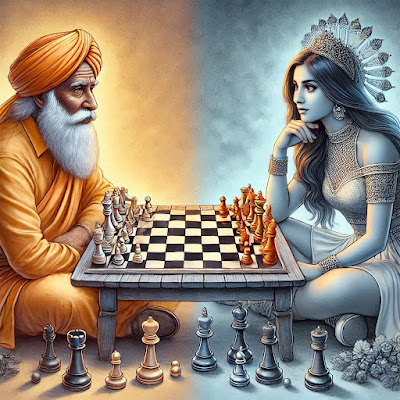Life is like Chess
 |
| All images AI-generated |
When Gukesh Dommaraju became the Chess Grandmaster at
the age of 18, I was reminded of my personal passion for the game as a young
boy. I learnt the game when I was ten years or so and I was so passionate about
it that I picked up a book by none less than Bobby Fischer, the most famous
chess champion of the time, to learn master strategies. I lacked the commitment
of Gukesh, however, and hence didn’t become any champion. But I loved playing
the game in those days. I loved the strategic moves it demands. The game is
like life in many ways. I failed to learn the strategies of a successful life,
however. That’s a different matter. You can be a loser in practical life in
spite of knowing a lot of theoretic strategies.
As we are moving on to a New Year, I am tempted to make a comparison between chess and life, though I failed to convert the theories to practice. Never mind my personal failures. My life has reached its autumn, and so my successes and failures are immaterial. Let me at least offer suggestions to others now.
Gukesh can foresee
the opponent’s moves much ahead. Any chess champion can do that. If you
know the game of chess, you also know that you need to anticipate the opponent’s
strategy with a prophet’s foresight. Now, isn’t life quite similar? If you can
set long-term plans, make calculated decisions, and adapt to challenges, you
become a champion in life.
You need to adapt
yourself all along the way. No matter how well you calculate your moves
on the chessboard, your opponent’s moves can force you to alter your strategy.
Life is just like that: it hurls on to your face unexpected events,
opportunities, and obstacles. You need to adapt yourself and rethink your
approach.
Each piece on the chessboard has
unique strengths and limitations. Knowing how to
use each piece effectively is very important. Even the tiny pawn, which we
often sacrifice easily in the initial stages of the game, can become the most
vital piece towards the end of the game. I remember how I used to be thrilled
if I could put an end to the opponent’s moves with a pawn sitting next to the
king. Of course, the pawn has to be backed by a more important piece. The pawn
sitting on the leg of a knight was one of my favourite strategies. There’s some
crookedness required in bringing the pawn to that position.
Once someone remarked watching my
game about how I failed utterly in bringing that crookedness
to life. I failed to understand people. People aren’t like chess pieces
at all. Chess pieces follow definite rules. And people don’t. My failure owed
itself to the lack of that understanding: that people don’t exist to serve my
interests unlike the pieces on my chessboard.
Chess teaches us to sacrifice certain pieces in order to get on with the
game successfully. Yes, such sacrifices are inevitable in life too. Time,
comfort, resources, and many other things may have to be sacrificed in order to
achieve our goals.
Each move on the chessboard has its consequences. Each move influences future possibilities.
Isn’t life quite similar? You are free to choose, but you are not free from the
consequence of your choice.
While winning is the goal, the process of learning, playing and enjoying the game
matters much in chess like in any other game. In life too, success is
important, but the journey, relationships, and experiences are what make it
meaningful.
The analogy can go on. But I don’t
want to take it too far. For one thing, the chess pieces won’t ever act outside
the established rules of the game. Can you imagine a bishop moving like a rook
or vice versa? But in real life, not only bishops but even prime ministers or ascetic
yogis can break rules in ways you won’t ever imagine. Learning the rules of
human life isn’t at all like mastering the game of chess. Nevertheless, let me
offer this lesson at the close of 2024.
Let me wish you grand
successes in 2025.


Hari OM
ReplyDelete...Perhaps life is more like Carrom, where all unsuspecting, a piece can be kicked in a totally different course! ... or that it the top one percent who are able to play Chess, leaving the rest of us to deal with the thunder and clap of Carrom...Whatever, we have the advantage no game piece ever has; free will. In the end, what we get out of life is reflective of how much we put in and how well we can rearrange our expectations when hurdles come.
May 2025 bring fewer hurdles, less curves, and smoother surfaces!!! YAM xx
In a way, life is like carroms... No rules whatever! But free will makes the difference. Free will is limited too, however, like in the case of a slave in old America or a shudra in old India.
DeleteWish you too a smoother 2025.
I haven't played chess in years. It requires a certain kind of dedication that I don't have. Life, I suppose, is similar in that regard as well.
ReplyDeleteI too lack that dedication and that's why I gave up the game too.
DeleteMy chess skills are pretty basic.
ReplyDeleteTry honing them with your life partner.
Delete